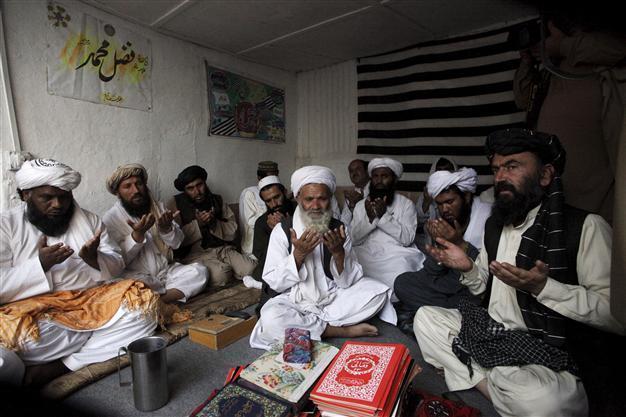Afghan delegation arrives in Pakistan to discuss peace
ISLAMABAD - The Associated Press

Supporters of Jamiat Nazariyati pray for late Taliban leader Mullah Muhammad Omar in Quetta, Pakistan, August 1, 2015. Reuters Photo
A high-level Afghan delegation arrived in Pakistan on August 13 to discuss an action plan after Islamabad-hosted peace talks with the Taliban were suspended last month, officials said.The one-day visit follows an angry speech by Afghan President Ashraf Ghani in which he claimed Pakistan was involved in a spate of devastating Taliban attacks that struck the Afghan capital last week, killing dozens.
Pakistan has expressed hope the visit can help revive stalled peace talks between Kabul and the Taliban.
Qazi Khalilullah, the spokesman for Pakistan's foreign ministry, said the Afghan delegation, which is headed by the Foreign Minister Salahuddin Rabbani, met with Pakistani Prime Minister Nawaz Sharif after arriving in Islamabad. He gave no details, but the Afghan delegation was also to meet with senior security officials.
The Taliban have been fighting the Kabul government for almost 14 years. Their recent attacks followed the announcement that their leader, Mullah Mohammad Omar, died two years ago.
Ghani's deputy spokesman Zafar Hashemi said the delegation, which was dispatched to Pakistan, also included national intelligence chief Rahmatullah Nabil and Acting Defense Minister Masoom Stanekzai. It was not clear if Rabbani would also meet with Iran's Foreign Minister Mohammad Javad Zarif, who is also currently visiting Islamabad.
"The Afghan government wants Pakistan to take action against those groups ... (who are) declaring war against Afghan people," Hashemi said in Kabul.
Ghani this week accused neighboring Pakistan of failing to take action against "suicide training camps and bomb-making facilities" on its territory used for attacks inside Afghanistan.
Pakistan, which denies supporting the Taliban, offered condolences for the victims of Kabul attacks and said it remains committed to maintaining good relations with the Afghan government.
Sharif's adviser on national security and foreign affairs, Sartaj Aziz, said he hoped the "misunderstanding" between the two countries could be resolved at the August 13 meeting.
Aziz also said Islamabad still feels "that reconciliation is the best option," referring to the Kabul-Taliban talks, but that it was up to the Afghan government to proceed at the pace it wants.
He added the Pakistanis plan to discuss with the Afghan delegation ways on how to revive the peace process.
"We will continue to help them in whatever way we can to bring peace," he said.
In late July, the Afghan intelligence service announced Mullah Omar had died in April 2013. The Taliban confirmed the death and pulled out of a second round of formal face-to-face talks with Kabul officials due near Islamabad. The first round of talks, held earlier in July, also in Pakistan, was deemed a success.
Fissures then emerged among the Taliban amid objections to the election of Mullah Akhtar Mansoor as Mullah Omar's successor.
















